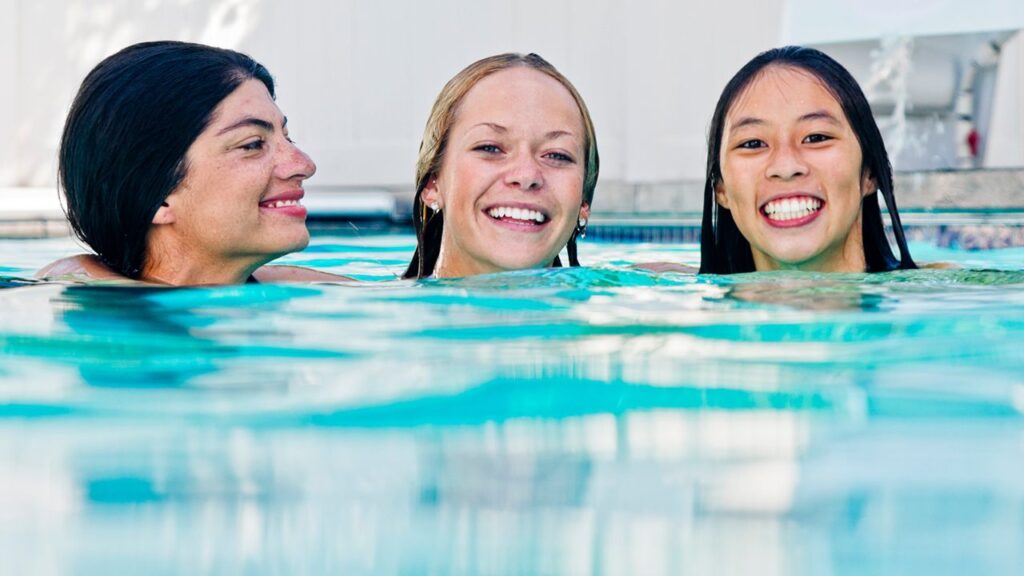If you want to be the best swimmer you need to become comfortable with the water and swim without goggles. If may you ever fall into the water, then you must be able to look around and be comfortable enough with the environment. And it’s easier to first learn to swim without goggles because if you already have reliance on goggles, learning to swim without them is a real challenge.
Swimming without goggles is not impossible. Many people swim without goggles and prefer to keep practicing that. The only difference is in the vision. With goggles, you get better visibility underwater. Otherwise, you don’t. However, you can still see to some extend and swim in the water without goggles. If you are swimming for a short period, then swimming without goggles will not be a problem.
Nonetheless, some tried and tested methods can help you while swimming without goggles. By no means do they resolve the problem of not having goggles? These tips and tricks can only ease the swimming and after-swimming experience.

How to Swim without Goggles |10 Tips and Tricks
Without any further delay, let’s get into the top 10 tips that can be helpful if you are swimming without goggles.
1. Squint Your Eyes
Many believe that squinting your eyes underwater helps you see better. It prevents the water from getting into your eyes. You might still see things blurry. However, this trick is good enough to understand the finish line or the lines of a pool.
2. Tie Your Hair
When you are somewhat visually paralyzed underwater, you do not want any more distractions. If you have long hair, it is better to tie them up. This way, hair cannot get in your face or eyes. You can also wear swimming caps, not only to secure them in place but also to protect them.
3. Avoid Dirty Water
It is best to avoid dirty water if you need to swim without goggles. Goggles prevent any dirt or debris from getting into your eyes. Getting dirt in your eyes can cause harm. Moreover, you get less visibility in dirty water. So, try to avoid dirty water if possible.
Chlorine-mixed water in the pool can also irritate your eyes. Therefore, avoiding them is also ideal. Some pools get cleaned by using salts. If you really have to swim without goggles, try choosing a swimming pool that uses salts.
4. Swim in Short Sessions
Swimming in short sessions allows some resting time for your eyes. Your eyes can get redness and cause irritation if you swim for a long period without goggles. Ideally, it is advised to take breaks after 15 minutes of swimming.
However, if you feel uncomfortable at any given time, stop immediately. You can try again after resting for a while.
5. Splash Pool Water
You can splash water on your eyes before diving in. if you dive right into the pool, the sudden rush of water can hit your eyes and cause discomfort. On the contrary, splashing water on your face and eyes is gentle. You can get used to having water on your eyes by splashing water.
6. Observe the Area
Get an idea about the surrounding of the pool before diving in. As you will have less visual capability underwater, try to observe the area and remember it. This way, you will know what direction to go or where the pool tends to be deeper.
7. Swim behind Someone with Goggles
While struggling to go straight into a swimming pool, you can tag along with someone with goggles. This way, you can go straight in your lane without interrupting others. The swimmer with goggles can guide you while swimming.
8. Remove Contact Lenses
If you are a contact lens user, remove them before going into the pool. They are not intended to be worn while underwater and cause irritation or discomfort. Moreover, chlorine or other elements in the water can damage contact lenses.
Your eyes will slowly build tolerance once you are swimming underwater, which can get disturbed with contact lenses.
9. Rinse with Clean Water
This one is more of after-swimming care. Once you are done swimming without your goggles, you need to thoroughly clean your eyes. You need to rinse your eyes with clean water. Without goggles, the water gets in contact with the eyes more, so cleaning them is essential.
10. Use Eye Drops
Eye drops are a lifesaver if you swim without goggles. They help reduce eye redness or irritation. You are most likely to feel irritation in your eyes after swimming without goggles due to chlorine or other components. Also, your eyes can feel dry and dehydrated. Using eye drops after swimming can make you feel at ease.
Conclusion
Swimming without goggles is somewhat about increasing tolerance levels. With practice, you can comfortably be swimming without goggles. However, it is suggested to use goggles in order to protect your eyes.
